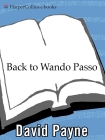Back to Wando Passo by David Payne (each kindness read aloud txt) 📗

- Author: David Payne
Book online «Back to Wando Passo by David Payne (each kindness read aloud txt) 📗». Author David Payne
I have seen the wicked in great power, and spreading himself like a green bay tree.
Yet he passed away and, lo, he was not; yea, I sought him, but he could not be found….
Seeking comfort, she turns to the Psalms, and at midnight, from her window, she perceives an orange glow on the horizon and stands outside for half an hour, not knowing if the Federals have invaded Charleston, if the slaves have risen up, watching the Great Fire move south from Hassell Street along East Bay, engulfing the market as it spreads west to Meeting Street, burning, eventually, all the way to the Ashley River along Tradd, leaving five hundred acres of the city a smoking ruin.
Back inside, she picks up Percival’s Wordsworth for the first time since Jarry left.
But, as it sometimes chanceth, from the might
Of joy in minds that can no further go,
As high as we have mounted in delight
In our dejection do we sink as low;
To me that morning did it happen so;
And fears and fancies thick upon me came;
Dim sadness—and blind thoughts, I knew not, nor could name….
So what is it that turns the poet’s thoughts from “Solitude, pain of heart, distress and poverty”? Remembering Jarry’s question, Addie seeks the answer on the page tonight and cannot find it there.
In the morning, for the first time in months, she sends the crews to work alone and takes the path into the swamp.
Clarisse is eight months pregnant now, and changed. Her former animation has been replaced by a wan languor. Instead of silk, she’s dressed in a loose frock of simple white and purple calico, and her hair is loose and halfway down her back.
“Are you doing this to me?” Addie demands.
Clarisse seems unsurprised. She neither replies nor asks her mistress in, her demeanor formal, polite and cold.
“What have I done to you?” asks Addie. “The past is what it is and can’t be changed, Clarisse. I, too, have been wronged, but I hold no grudges. We are two women here alone. Can we not live in peace?”
Clarisse stares into Addie’s eyes with a severe and threatening neutrality. “You hold no grudges….”
“None. I’ve borne and bear you no ill will.”
“The gun bears no ill will,” she answers, “but it kills you nonetheless. You want peace and bear no grudge, but it’s you, nene, you who are the bullet in my head. Afuera con embuchado, china.” Her eyes smolder, and she steps onto the porch. “If you want peace, there is the road.” She points. “Stay, and you will die. This is your warning. I give you only one. It is a promise, not a threat.”
“You hate me, don’t you? Why?”
“If you were starving,” Clarisse replies, “I would take the final crust of bread out of your mouth and watch you starve and spit upon your grave and dance for happiness when you were dead. And all this, I would consider justice.”
Her hate is like a wind that blows Addie back against the rail. “Justice? To return deliberate harm for harm unmeant?”
“This was my father’s land,” says Clarisse, “where you now live. My mother put her whole life into it; my brother, Jarry, much of his. It belongs to Harlan now, my brother. If he should die, is it your intention to surrender it to me and to my child, Harlan’s child, what is ours through blood and right, which you’ve done nothing for?”
“Whatever you’ve been to him, Clarisse, I’m Harlan’s wife. If we have children, the property will pass to them.”
“There is your answer then. Ask yourself, nene, if you were me, if you had ‘been to him’ what I have been, and loved as I have loved, and suffered what I felt, if you now carried in your body what I hold in mine, would you not feel what you intend as harm and would not that harm seem ‘meant’?”
Addie can muster no reply to this.
“Harlan was like you,” Clarisse goes on, “and, before him, Father. He meant no ‘harm’ when he took my mother and sailed away with her, leaving me with Wenceslao. Harlan told you something of my history. What he did not tell you was who that old man was to me. From the time I was eight years old, china, Wenceslao came to my room at night, this man I believed to be my father. Do you know what it is, when a man does this? It is as if he puts a knife into your tender place. That place is not made to feel bad feeling, but for one thing only, to feel what is dulce, oloroso…sweet…And if you put a knife into a place that is meant only for sweetness, what is it you feel? Sweetness, china. This is what he did to me. For years, he put his tired old knife into the place of sweetness, and because I was a child and knew nothing else, I took this for love. For love. You see? I thought this is what fathers do. I thought this is family, this is human





Comments (0)